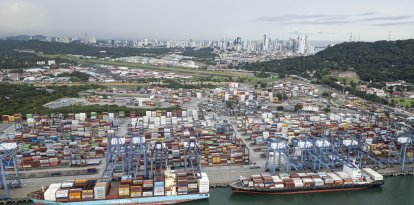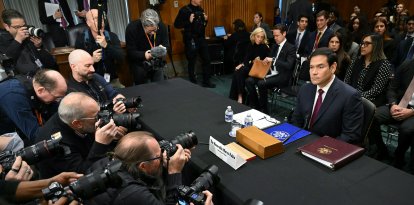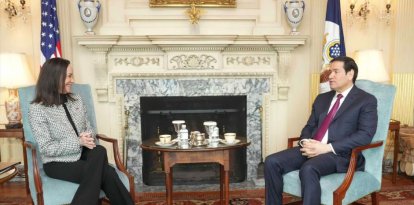Fentanyl, illegal immigration and trade: What does Claudia Sheinbaum's victory in Mexico mean for the United States?
Andrés Manuel López Obrador's (AMLO) candidate beat Xóchitl Gálvez and Jorge Álvarez Máynez. She will take office in early October.

(Jorge Nunez/ZUMA Press Wire)
Claudia Sheinbaum will be the new president of Mexico. With the political endorsement of Andrés Manuel López Obrador (AMLO), she managed to comfortably win the elections, beating Xóchitl Gálvez and Jorge Álvarez Máynez. After some changes in the electoral rules, her inauguration was brought forward to October 1.
The 61-year-old academic will inherit the good and the bad of her predecessor. On the one hand, there is the erosion of the rule of law, given the advance of cartels, human trafficking and crimes related to extortion. This has eroded trust in public institutions among the electorate, which the new president, who will take office on October 1, will have to face.
However, Mexico also has declining inflation, a strengthened local currency, a stable economy and particularly a demographic that The Wall Street Journal described as “enviable,” given that the average age is 30 years old.
When addressing foreign policy with the United States, it remains to be seen if she will seek to maintain AMLO's pendular strategy or opt for something new. What is not so uncertain is that the relationship will be crossed by fentanyl, illegal immigration and trade volume, with particular attention to immigration from China.
AMLO's legacy with the United States
During López Obrador's six-year term, which began at the end of 2018 and will end on October 1, foreign policy was greatly influenced by the United States and Latin America. As is often the case, northern neighbors have a lot of influence on Mexico's geopolitical decisions.
In the case of AMLO, who governed first with Donald Trump and then with Joe Biden, he combined commercial and immigration advances with a few discursive frictions and a wound that remains open with the fentanyl problem.
AMLO cultivated a good personal relationship with Trump, with whom he negotiated the "Remain in Mexico" policy and reviewed competitive issues of the trade agreement baptized as NAFTA 2.0. However, there were also frictions over immigration and economic issues, which, in the latter case, led to a temporary suspension of dialogue.
The arrival of Biden to the White House first meant a cooling in terms of the good personal harmony that existed with his predecessor, but as the months passed, tensions eased.
Both leaders worked primarily to boost trade further, culminating in Mexico becoming the United States' top trading partner, surpassing China's export volume by mid-2023.
At least on paper, they signed the Bicentennial Dialogue for economic issues and the High-Level Dialogue for security issues.
However, AMLO's rhetoric was consistently hostile to his neighbors' foreign policy, calling it “offensive and arrogant.”
Given Sheinbaum's almost complete closeness to AMLO, the new president is expected to continue her attempt to balance trade cooperation with offensive rhetoric toward the United States.
As for Latin America, at the risk of offending Trump and Biden, he brought closer positions with the dictatorships of the region, Cuba and Venezuela, as well as with the most leftist administrations in the region, such as Gustavo Petro's Colombia and Gabriel Boric.
Fentanyl, trade volume and migratory flow: Sheinbaum's main challenges with the United States
Although the presidential elections in November could greatly influence every one of these problems, it is expected that they will be the keys to diplomatic relations in the coming years between both countries.
Regarding fentanyl, AMLO denied time and time again that this opioid that is causing havoc in the United States is produced in Mexico. However, in mid-April, he ended up acknowledging the existence of local production for the first time in five years in an interview with CBS.
His statements came just days after Felipe de Jesús Gallo, head of the Mexican Criminal Investigation Agency, stated that Mexico was “the champion” of fentanyl production.
With this in mind, Sheinbaum will have to negotiate with whoever is president of the United States to combat local production and, of course, prevent the crossing of this lethal opioid into the United States, which has not stopped growing.
According to the National Immigration Forum and based on statistics from the United States Customs and Border Patrol, fentanyl seizures during fiscal year 2023 exceeded those of the previous three years.
In turn, compared to fiscal year 2023, fentanyl seizures at the southern border increased 480% compared to 2020.
Closely tied to fentanyl is the problem of illegal immigration on the southern border, which reached record numbers during the Biden administration. Indeed, since Biden arrived at the Oval Office in January 2021, more than 7 million illegal crossings have been recorded, a number greater than the population of 36 states. A Border Patrol agent recently said that it is "the cartels" who control the southern border.
If Trump returns to the White House, he will likely try to resume the "Remain in Mexico" policy. Officially called Migrant Protection Protocols, it forced those seeking asylum in the United States to wait in Mexico while their legal procedures were resolved. Mike Pompeo, then Secretary of State, negotiated the implementation of this policy during the Trump administration with his Mexican counterpart, Marcelo Ebrand.
Finally, trade will play a central role in the next two administrations. It turns out that the United States, Mexico and Canada will have to meet in 2026 to discuss whether to extend the aforementioned NAFTA 2.0 beyond 2036, when the treaty will expire.
At the same time, we will have to see what happens with the trade volume between the two countries with Claudia Sheinbaum and her future counterpart, as well as the policy with China, given that some analysts point out that Xi Jinping is trying to avoid trade sanctions through Mexico.
“Washington officials are concerned that Chinese companies are using Mexico as a backdoor to enter the United States, avoiding tariffs. Several Chinese electric vehicle manufacturers have set up shop in Mexico. The Mexican authorities have been slow to address this issue, but if they do not 'it could be the end of the free trade agreement,'" they explained in The Economist.

























